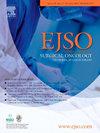一项单中心回顾性队列研究表明,反复肝切除术后复发性肝细胞癌患者血清甲胎蛋白阴性预示预后良好
IF 3.5
2区 医学
Q2 ONCOLOGY
引用次数: 0
摘要
血清甲胎蛋白(AFP)是诊断为肝细胞癌(HCC)患者的重要预后指标。研究基线AFP (b-AFP)、复发AFP (r-AFP)及AFP水平变化对反复肝切除术后复发性肝细胞癌(RHCC)患者预后的影响具有重要的临床意义。方法选取2006年1月1日至2019年12月31日在中山大学第一附属医院肝胰胆外科中心行反复肝切除术的400例RHCC患者。分析重点评价b-AFP、r-AFP及AFP水平变化对RHCC患者预后的影响。结果肝切除术后肝癌复发率约为40.03%。400例行两次肝切除术的HCC患者,5年死亡率为34.25%,总死亡率为38.75%。生存分析显示,b-AFP(−)组和b-AFP(+)组在总生存期(OS)和无复发生存期(RFS)方面存在统计学差异,后者的OS和RFS更短。两组的3年死亡率分别为31.7%和42.5%。两组的中位总生存期(mOS)分别为107.4个月和89.5个月。r-AFP(−)组和r-AFP(+)组的复发-死亡生存(RDS)差异有统计学意义(P <;0.0001), r-AFP(+)类患者的RDS较短。两组的中位RDS分别为88.1个月和31.7个月。AFP(+/+)、AFP(±)、AFP(- /+)和AFP(- /−)组的总生存期(OS)和RDS均有显著差异。OS和RDS由低到高的排列顺序为:AFP(+/+)组<;AFP(−/+)组<;AFP(−/−)组<;AFP(±)组。无论b-AFP状态如何,与r-AFP阴性患者相比,r-AFP阳性患者的OS和RFS明显较短。4组患者3年死亡率分别为50.9%、26.1%、39.3%和29.7%。中位OS值分别为42.4个月、未达到(NA)、77.1个月和107.4个月。此外,对每组的累积1年、3年和5年OS、RDS和RFS率进行分析。结论b-AFP、r-AFP及AFP波动可作为两次肝癌切除术患者预后的重要指标。这些指标可以为指导此类患者HCC复发的诊断和治疗策略提供有价值的见解。本文章由计算机程序翻译,如有差异,请以英文原文为准。
Negative serum alpha-fetoprotein at recurrence predicts good prognosis in recurrent hepatocellular carcinoma patients receiving repeated hepatectomy:a single-center retrospective cohort study
Background
The serum alpha-fetoprotein (AFP) serves as a crucial prognostic indicator in patients diagnosed with hepatocellular carcinoma (HCC). Examining the impact of baseline-AFP (b-AFP), recurrence -AFP (r-AFP), and changes in AFP levels on the prognosis of individuals with recurrent hepatocellular carcinoma (RHCC) who undergo repeated hepatectomy holds substantial clinical significance.
Method
A total of 400 RHCC patients who had undergone repeated hepatectomy in the Center of Hepato-Pancreato-Biliary Surgery at the First Affiliated Hospital of Sun Yat-Sen University between January 1, 2006, and December 31, 2019 were included in this study. The analysis focused on evaluating the impact of b-AFP, r-AFP, and changes in AFP levels on the prognosis of RHCC patients.
Results
The recurrence rate among HCC patients who underwent hepatectomy was approximately 40.03 %. Among the 400 HCC patients who underwent twice hepatectomy, the 5-year mortality rate was 34.25 %, with an overall mortality rate of 38.75 %. Survival analysis indicated statistically significant disparities in overall survival (OS) and recurrence-free survival (RFS) between the b-AFP (−) group and the b-AFP (+) group, with the latter exhibiting shorter OS and RFS. The 3-year mortality rates for the two groups were 31.7 % and 42.5 %, respectively. The median overall survival (mOS) for the two groups were 107.4 months and 89.5 months, respectively. A statistically significant discrepancy in recurrence-death survival (RDS) was observed between the r-AFP (−) and r-AFP (+) groups (P < 0.0001), with patients in the r-AFP (+) category experiencing a shorter RDS. The median RDS for these two groups were 88.1 months and 31.7 months, respectively. Significant differences in both overall survival (OS) and RDS were observed among the AFP (+/+), AFP (±), AFP (−/+), and AFP (−/−) groups. The order of OS and RDS from lowest to highest was as follows: AFP (+/+) group < AFP (−/+) group < AFP (−/−) group < AFP (±) group. Irrespective of the b-AFP status, patients with positive r-AFP exhibited notably shorter OS and RFS compared to their r-AFP negative counterparts. The 3-year mortality rates for the four groups were 50.9 %, 26.1 %, 39.3 %, and 29.7 %, respectively. Median OS values were 42.4 months, not reached (NA), 77.1 months, and 107.4 months, respectively. Furthermore, an analysis of the cumulative 1-year, 3-year, and 5-year OS, RDS, and RFS rates for each group was conducted.
Conclusion
The b-AFP, r-AFP and AFP fluctuations serve as valuable prognostic indicators in individuals who have undergone hepatectomy for HCC on two occasions. These indicators can offer valuable insights for guiding the diagnosis and treatment strategies for HCC recurrence in such patients.
求助全文
通过发布文献求助,成功后即可免费获取论文全文。
去求助
来源期刊

Ejso
医学-外科
CiteScore
6.40
自引率
2.60%
发文量
1148
审稿时长
41 days
期刊介绍:
JSO - European Journal of Surgical Oncology ("the Journal of Cancer Surgery") is the Official Journal of the European Society of Surgical Oncology and BASO ~ the Association for Cancer Surgery.
The EJSO aims to advance surgical oncology research and practice through the publication of original research articles, review articles, editorials, debates and correspondence.
 求助内容:
求助内容: 应助结果提醒方式:
应助结果提醒方式:


